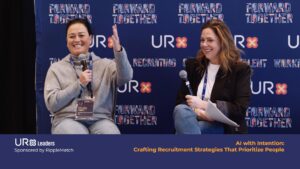RippleMatch partnered with URx to host a roundtable discussion giving campus recruiters a forum to discuss closing early career candidates and reducing offer reneges. RippleMatch is a tech platform for early career hiring that emphasizes both virtual and diversity recruitment and URx, is made up of early career talent focused recruiters and part of the OneReq Community for talent acquisition professionals.
Here are some of the takeaways from our discussion.
Campus recruiters are dedicated to creating a unique candidate experience in order to engage students.
Coming up on two years of virtual recruitment, both recruiters and candidates are experiencing “Zoom fatigue.” Across the board, virtual event attendance has dropped significantly during this recruitment cycle. Some recruiters try to offset Zoom fatigue by offering phone calls instead, or even outdoor, in-person meetings during the interview process. There are also creative approaches to keeping candidates interested—one company compiled a video feature of three apprentices discussing how the opportunity had impacted their life and career, which allowed candidates to envision themselves more clearly in the role.
one company compiled a video feature of three apprentices discussing how the opportunity had impacted their life and career
Another challenge that arises with early career candidates is competition—how do you set your company apart from your competitors? The use of personal touches, like handwritten notes or personal calls from hiring managers, can help demonstrate value and empathy to candidates. Creating a branded LinkedIn graphic for new hires to announce their new job can also encourage them to feel pride about their acceptance, and makes them more likely to honor their commitment.
Recruiters are getting creative and leveraging personal connections to avoid reneged offers.
During the past two years, recruiters have had to get even more creative with events or regular touchpoints to keep candidates warm between their offer and their start date. Many companies keep in touch with new hires in a Slack channel or LinkedIn group, which also allows the new hires to network with each other and build relationships with their future coworkers. One company planned out an executive talk series to keep candidates engaged and excited. Multiple participants agreed that sending out company-branded swag or small gifts (such as Starbucks cards, mugs, etc) were effective ways to maintain communication with the candidates.
Another way that recruiters are avoiding dropped offers among early career candidates is through the use of strategic timelines. Some recruiters opted for very short offer signing turnaround times to create urgency, whereas others used more flexible deadlines. Those who gave candidates more time felt that this approach was more inclusive, as it allowed candidates less familiar with the process time to discuss their options with their families and advisors.
Diversity and Inclusion continues to influence approach to late stage recruitment.
A question was raised about how to better serve diverse students in more advanced stages of the hiring process. Many participants mentioned expanding efforts to go to a larger assortment of schools, and inclusion conferences such as Grace Hopper, but keeping underrepresented candidates interested in the job requires dedication beyond top-of-funnel hiring efforts. Some recruiters have also started to offer relocation and sign-on bonuses to their early career hires, making the hiring process more equitable for candidates coming from all socioeconomic backgrounds while also helping offer close rates in a candidate-driven market.
Another valuable suggestion was to change up the interview process to include one manager/soft skills interview in addition to a technical interview, allowing for more flexibility within the hiring process. Some companies also have underrepresented employees at the organization reach out to candidates—for example, some employees who had attended HBCUs offered to meet with candidates who were from their alma mater. Showing candidates that there is real representation in the workplace beyond the interview process is crucial to diversifying incoming classes of interns and entry level hires.
During this workshop, we uncovered that Gen-Z candidates, tech-savvy as they are, respond well to personal connections and love the opportunity to speak with company leaders. The candidates in this generation are also in high demand, and when it’s a candidate’s market, companies need to be more creative. To secure the commitment of in-demand early career candidates, you really need to show them how your workplace is unique—and why they would be a valued addition.
About RippleMatch
RippleMatch is a tech platform for early career hiring that emphasizes both virtual and diversity recruitment. Since launching from a college dorm room, RippleMatch has expanded to over 800 campuses, raised over $28 million in venture funding, and brought on some of the most exciting clients in the country, ranging from Fortune 500 companies to rapidly-growing, innovative startups.





